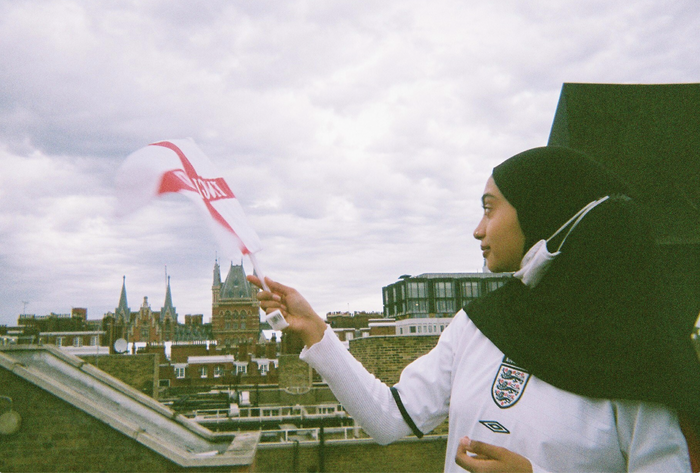Where is your accent from?
Aatqa Arham reflects on her multicultural identity and her journey to accepting her accent and all it represents

One of the first impressions we get from people comes from their voice, with their unique intonation and rhythms they gravitate towards out of habit. Through my writing you can’t hear my accent (though I hope you enjoy my syntactical arrangements), however, I can relate to you that my accent is often the subject of curiosity to my new acquaintances. There is a distinct quality to some conversations I have, characterised by a slight cloud of concentration and questioning which seeks to prolong the conversation, followed by an outburst of “your accent is lovely, where is it from?!” Since coming to university my go-to response is, “I’d like to hear where you think.” There are those polite keepers of the peace who respond with a fumbling “oh, I’m not sure, I can’t tell”, or the more bold America, Ireland, Canada types, versus the off-the-wall categorisers placing me as far-flung as South Africa. I must say when people guess Scotland on the first attempt, I am very impressed by the astute accent-informed individuals they are.
“My feelings of Scottishness have been derived from other people’s opinions and expectations”
I do get a special “oh, I haven’t lost it yet”, warm, fuzzy feeling when someone guesses correctly. I was born and bred in Scotland, leaving at age 11 and then returning for one year when I was 14. For a long time, Scotland was my home, in a literal and metaphorical sense. It was where I belonged, where I’d built childhood memories, and the culture I was most acquainted with. After returning to England when I was 15 this relationship had completely soured, and I no longer felt like I wanted the label of ‘Scottish’ to my name. This accent of mine, however, clearly had ideas of its own.
After moving to England, I distinctly remember watching an interview of an elderly woman who had moved out of Scotland when she was 16 to live in London, and no traces of her Scottish accent remained. At first, I used to hope I wouldn’t lose mine, even though it had to be toned down to a slower-paced version intelligible by my classmates. However, when I moved back to England, I began to hope it would fade out: that I would be able to pass as a Londoner, and not relate my phoney ‘Scottishness’ to the curious small talker.
“I’ve found roots in Scottish history in India, the Pakistani communities in Scotland, and Scotland’s Islamic tartan”
This Scottish identity caused me anguish and hurt. Whilst people gushed over the beauty of the Highlands, I would smile and nod because, while I’d visited Loch Ness and Ayr, our family hadn’t ventured much further owing to lamentations over Scottish weather. “Have you ever had haggis?” No, because my parents are Muslims who immigrated from Pakistan, so we only eat halal food, and halal haggis? Well, that was always too much effort than it was worth. Ceilidhs? We did some in primary school, but my parents didn’t have many Scottish friends so we never experienced them. Celtic and Rangers, Square Sausages, Rabbie Burns: the associations I have with Scottish things are real and intimate, an intrinsic part of me. But they never seemed Scottish enough to others and, by extension, me. I began to loathe this half identity and the negative experiences of racism my family and I had associated with Scotland, without really understanding that what mattered was feeling Scottish at heart.
Upon reflection, my feelings of Scottishness have been derived from other people’s opinions and expectations. Snide comments passed in the lunch hall at primary school. “Why does your food smell like that?” by Xander, my Primary 5 classmate. “You’ve never had a fried Mars bar?” asked a friend who lived in the English Midlands. “Saying you are Scottish is misleading; your family is from Pakistan,” said a friend from the suburbs of London. All of these things have grown like ivy over my Scottish identity, where I’ve obscured something which is so deeply felt about myself because of other people’s assumptions.
What I’ve learnt over the past few years is that almost nothing is binary when it comes to identity. There is no standard ‘Scottish accent’ per se and while relating to cultural identifiers such as food and dress is wonderful, there is no standard association every Scot makes to the kilt. Skin colour isn’t an identifier; it’s a component of how I’ve experienced my Scottishness. Heritage isn’t a monolithic structure, and I’ve found roots in Scottish history in India, the Pakistani communities and legacies in Scotland, and Scotland’s Islamic tartan. All that put to one side, my eternal love for Irn-Bru is one of my greatest prides in life.
So next time someone asks where my accent is from, I’ll say Scotland with my chest — perhaps not quite with the heart of William Wallace, but by the end of this degree at Cambridge, I hope I’ll be pretty close.
 Features / Should I stay or should I go? Cambridge students and alumni reflect on how their memories stay with them15 December 2025
Features / Should I stay or should I go? Cambridge students and alumni reflect on how their memories stay with them15 December 2025 News / Dons warn PM about Vet School closure16 December 2025
News / Dons warn PM about Vet School closure16 December 2025 News / Cambridge study finds students learn better with notes than AI13 December 2025
News / Cambridge study finds students learn better with notes than AI13 December 2025 News / News In Brief: Michaelmas marriages, monogamous mammals, and messaging manipulation15 December 2025
News / News In Brief: Michaelmas marriages, monogamous mammals, and messaging manipulation15 December 2025 Comment / The magic of an eight-week term15 December 2025
Comment / The magic of an eight-week term15 December 2025










